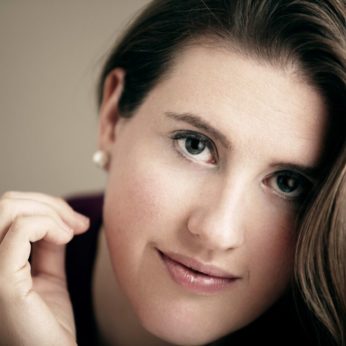Composer: Sofia Gubaidulina (b. 1931)
Performance date: 02/07/2015
Venue: Bantry Library
Composition Year: 1987
Duration: 00:13:20
Recording Engineer: Richard McCullough, RTÉ lyric fm
Instrumentation Category:Octet
Instrumentation Other: S-solo, 2vn, va, vc, cl, hn, bsn, db
Artists:
Katherine Dain -
[soprano]
Chloë Hanslip -
[violin]
Liana Gourdjia -
[violin]
Brett Dean -
[viola]
David Cohen -
[cello]
Mathias Kjøller -
[clarinet]
Hervé Joulain -
[horn]
Peter Whelan -
[bassoon]
Niek de Groot -
[double bass]

Schubert’s
Octet, with its unusual line-up of string quintet plus a trio of lower winds,
has led to a number of commissions for the same instrumental combination by
concert promoters seeking a first half work to accompany a performance of the
Schubert. Gubaidulina is renowned for composing works for the most varied kinds
of chamber ensembles, though, by her standards, this would have been a
conservative line-up. The addition of the soprano was the result of her
discovery of Eliot’s Four Quartets; famously
Eliot was hugely influenced by Beethoven’s late quartets when writing his magnum opus so music and poetry come
full circle with Gubaidulina’s setting.
Gubaidulina
has spoken of the sadness at the heart of
my music, which is partly a Russian thing – Russian music is always about pain. However Gubaidulina felt she
had found a kindred spirit in Eliot: His thinking about time – that past, present and future
contain each other – very much struck my mystical thoughts about eternity.
She was especially taken by his verses on the problem of creation, where every attempt is a wholly new start, and a
different kind of failure. As she put it herself: All my work is just attempts. I know that when I write that it will
never fulfil my intuitive hopes for it – that is why it is sad. However for
us lesser mortals the results are hugely impressive – and, in this case, deeply
moving.
The
whole work is played without a break and from the jagged opening phrases in the
violins to the organ-like chords that precede the strange coda in the first
strings-only movement, we aware that we are in the presence of a great
composer. The short second wind trio movement is opened to great effect by the
horn, while the soprano is introduced in the third movement a capella – at the
still point of the turning world. The string quintet returns for the
mysterious, pizzicato fourth movement leading directly to the ceremonial opening
of the terrifying fifth movement. To a gradually intensifying procession of
savage string chords the soprano enters in a wordless duet with the horn until
eventually Eliot’s gruesome text gradually takes shape as the strings grow
fiercer and fiercer. Slowly the ensemble, not without protest, collapses,
leaving the soprano on her own with the
dripping blood.
The
gentle sixth movement for clarinet and string trio provides unexpected and much
needed lyricism. Eliot’s test comes to mind:
Love is most nearly itself
When here and now cease to
matter,
Old men ought to be
explorers
Here and there does not
matter
We must be still and still
moving
Into another intensity.
This
other intensity follows in a movement of overwhelming power and flaming beauty.
Gubaidulina builds up over twenty pages of the score to an incandescent setting
of the final mystical stanza of Eliot’s fourth Quartet where the rose and the
fire become one. We could not be further from Schubert’s lovely Octet and the
Festival’s original plan to follow in the commissioner’s footsteps collapsed in
the face of this devastating music.
Copyright © 2025 West Cork Music. All rights reserved.
Designed and developed by Matrix Internet